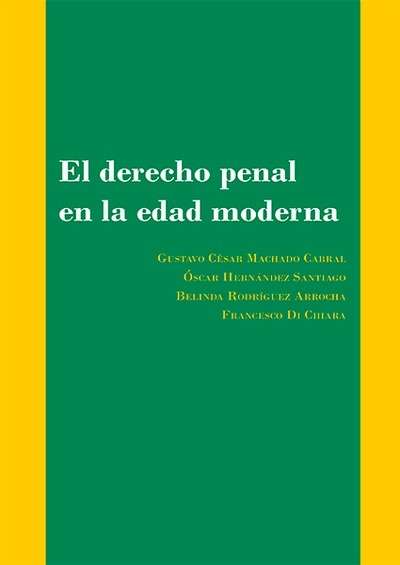El derecho penal en la edad moderna
Nuevas aproximaciones a la doctrina y a la práctica judicial

Editorial Dykinson
Colección Carlos III. Historia del Derecho
Lugar de edición
Madrid, España
Fecha de edición junio 2016 · Edición nº 1
EAN 9788490858127
222 páginas
Libro
encuadernado en tapa blanda
Dimensiones 170 mm x 240 mm
Resumen del libro
In the past years the history of criminal law has gained growing importance within the vast scope of legal history. The research of the Max-Planck-Institute for European Legal History reflects this development in many respects: Since the directorship of Prof. Dr. Michael Stolleis the history of public law blossomed as a new area of research including such topics as penal law, police ordinances and norm enforcement. They constitute the core of a specific research field and a research group led by the signer that deals with the history of criminal law and criminal justice between the late Middle Ages and the modern age. Accordingly the Max-Planck-Institute for European Legal History has expanded its respective collections - in particular the writings of the ius commune jurists within the field of criminal law - and has intensified the co-operation with researchers who study the history of penal law and criminal justice. These researchers from all over the world do not only use the library but also present and discuss their topics, approaches and insights in colloquia, workshops and meetings with the researchers of the Max-Planck-Institute for European Legal History. This collected volume is a result of these research endeavours. As guest researchers Prof. Dr. Machado Cabral, Dr. Francesco di Chiara, Hernández Santiago and Rodríguez Arrocha did not only improve their respective case studies on early modern criminal law but have also developed common and comparative aspects of their research within the scientific framework of the Max-Planck-Institute for European Legal History. One result is a mutual methodological approach of the four contributions to this book: the interdependencies of criminal law, juridical discourses/doctrine and judicial practice. A prime source that facilitates such an approach are the decisiones and similar collections. They draw from practical experience and condense single cases to juridical knowledge that was used for teaching purposes and, most notably, in actual court practice. Using such an approach the four chapters analyse a broad variety of examples and provide insights in the early modern criminal procedure and the interrelated questions of discretion and jurisdictional collisions. Moreover, also specific conflicts and crimes are addressed such as asylum and immunities or stuprum, lése majesty, theft and homicide. The interdependences between law, discourses and practice constitute not only a basic angle of this book but correspond with the theoretical framework of the respective research projects of the Max-Planck-Institute for European Legal History. This in particular applies to the transnational exchange of legal knowledge and practices, which range from European legal systems in Portugal, Sicily and Spain to New Spain. In this regard the case studies of this book on criminal law, juridical discourses/doctrine and judicial practice within the scope of the European ius commune communication network open up a global legal perspective on the pre-modern history of penal law and criminal justice.








